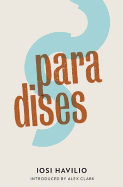
In the first sentence of Paradises, Iosi Havilio disposes of the romantic lead of his first book, Open Door, by having him run over. This sends Havilio's unnamed female narrator into a downward spiral that will leave her fighting for survival with her young son in a Buenos Aires slum.
This fascinating narrator is a strangely passive woman unburdened by moral considerations, who casually injects herself with someone else's morphine and steals a baby iguana from the zoo. She's too passive to say no to her daffy friend's plan to steal from her boyfriend's rich parents. Though coming out of a four-year relationship with a man, all of her bonds now are with women. The novel is crowded with female characters, like Iris, the Romanian babysitter who gets the narrator a job at the zoo, and Tosca, an immense woman who needs an injection of morphine every morning and night.
But most of all, there's Eloisa, the sexually uninhibited tattooed blonde first seen in Open Door. This potty-mouthed pothead is Havilio's finest creation, and effortlessly dominates the novel. An inexhaustible stream of eccentric characters, the marginal citizens of Buenos Aires, parades through Havilio's fiction. The plot is free-form, with parties erupting in the street, fistfights breaking out in restaurants and lost old friends appearing out of nowhere.
"This place is hell," says the narrator's best friend, taking in her wretched new living quarters. "Things turned out this way," the narrator replies, and that sums up Havilio's sense of the random momentum of life, the unexpected conjunctions that can lead a mother to raise her son among dealers and thugs and still have hope for the future. --Nick DiMartino, Nick's Picks, University Book Store, Seattle, Wash.

